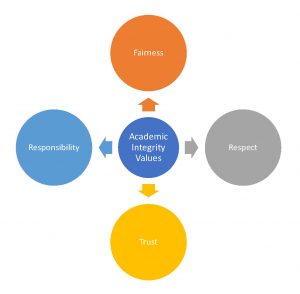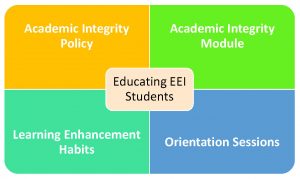Academic Integrity
Academic integrity is essentially about ensuring ethical and honest behavior and practice in all academic pursuits, especially activities related to assessment including:
- Assignments
- Class tests
- Final examinations
Key principles of academic integrity include:
- commitment to providing assessments where the work you present is your own;
or
- if you have used sources, then the precise nature, extent and origin of these sources are specifically acknowledged.
In other words, you are not trying to claim as your own work something you have copied from another person or source. If you are in doubt, ask your teacher or tutor. It is an important part of your learning.
Academic Misconducts
In summary, Academic misconduct includes but is not limited to conduct that involves plagiarism and any other dishonest conduct by a student to gain academic or general advantage; or conduct that otherwise contravenes the provisions of the Institute’s academic rules, policies, procedures and/or guidelines. Dishonesty in the preparation or presentation of any assessable work is regarded as student academic misconduct. Academic misconduct includes, but is not limited to:
- Cheating: behaving deceitfully or dishonestly in examinations, in the preparation of assessable items and during in-class tests;
- Fabrication: intentional and unauthorised falsification or invention of any information or citation in an academic exercise;
- Intentionally or recklessly facilitating academic dishonesty by other students;
- Providing an assessment item, or providing access to an assessment item to others, either directly or indirectly, in circumstances where it is reasonably foreseeable that it will be used dishonestly.
- Deceitful behaviour by which it is sought to gain some unfair or dishonest advantage either for yourself or for another person;
- Misleading ascription of authorship (including claiming authorship of parts of a group assignment prepared by other students);
- Misrepresentation: misrepresenting data or information incorrectly, improperly or falsely;
- Behaving in any way that limits the academic opportunities of other students by improperly impeding their work or their access to educational resources;
- Re-using one’s own work without appropriate acknowledgement;
- Using unauthorised equipment or material in an assessment item; and
- Using another person to undertake an examination or assessment item in your name.
Determining a level of seriousness for a breach of academic integrity and determining appropriate penalties:
The Institute refers all breaches of academic integrity according to a four-level classification framework according to the nature of the infraction. For each level of violation, a corresponding set of penalties is recommended.
Academic Integrity Module
EEI has an Academic Integrity Module which all students have to complete through Moodle on a regular basis. The purpose of this module is to provide EEI students and staff with comprehensive information on what is meant by ‘Academic Integrity’ and how it is applied at the Institute.
- The Academic Integrity Module is compulsory and must be completed within the first 2 weeks of each Trimester.
- You will not be able to access your Assignment Submission Links of your enrolled units until you completed this Academic Integrity Module.
- Progress on this module will be monitored by EEI Student Admissions Staff.
- A test (Compliance Check) follows the Module which consists of 20 questions. You need to answer all questions correctly.
- If you fail to achieve a mark of 20/20, you will need to re-do the test.
- It is important that you are clear about EEI’s requirements and expectations around Academic Integrity. This is to educate you and provide you with transparent information on what potential detrimental consequences a breach of EEI’s Academic Integrity might have on your enrolment at EEI and subsequently your Student Visa.
- In your first lecture at EEI, staff will also review the information in this module. During this session staff will
– note student attendance;
– randomly questioning students on contents of the module;
– respond to questions from students about academic integrity issues.
- Students can approach EEI staff at any time should you have questions regarding Academic Integrity.





